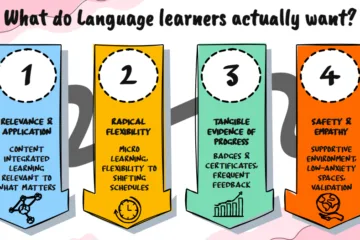The corporate training industry has embraced gamification enthusiastically, adding points, badges, leader boards, and game mechanics to learning programmes with varying degrees of success. However, effective language learning engagement requires substance over gimmicks, creating meaningful experiences that sustain motivation through genuine achievement rather than superficial game elements that quickly lose appeal.
The gamification reality check
Many corporate learning programmes mistake superficial game mechanics for genuine engagement strategies. Adding point systems to boring content doesn’t make it interesting. Awarding badges for minimal achievements doesn’t create lasting motivation. Leaderboards that rank colleagues publicly often create anxiety rather than healthy competition.
Effective language learning engagement comes from meaningful progress, authentic achievement, and practical capability development that participants value intrinsically. Professional language classes create genuine engagement through relevant content, supportive environments, and tangible skill development rather than relying on artificial game mechanics.
The intrinsic motivation principle
Research demonstrates that intrinsic motivation (desire to develop genuine competence) produces better learning outcomes than extrinsic motivation (desire to earn points or badges). Adult professionals learning business languages respond best to training that helps them succeed in actual professional contexts rather than artificial game scenarios.
Corporate training that creates intrinsic motivation through relevant business applications, immediate practical value, and authentic achievement produces sustainable engagement that outlasts the novelty appeal of game mechanics. Team learning environments naturally generate intrinsic motivation through peer support and collective progress celebration.
The meaningful progress approach
Genuine engagement comes from experiencing meaningful progress toward valued goals. When participants can conduct business conversations they couldn’t manage previously, when they successfully present to international clients, when they negotiate confidently in their target language, they experience authentic achievement that motivates continued effort.
Business languages programmes should structure learning around meaningful capability milestones that participants recognise as genuine progress. These authentic achievements create engagement that game points simply cannot replicate because they deliver real professional value.
The social engagement advantage
Humans engage naturally with learning experiences that involve social interaction, peer collaboration, and collective achievement. Small group language classes leverage these social dynamics to create engagement that isolated, gamified programmes cannot match.
Team learning creates natural accountability, friendly competition, and mutual support that sustain motivation far more effectively than artificial leaderboards or point systems. Colleagues who learn together develop genuine relationships whilst building language capabilities through collaborative practice.
The challenge-skill balance
Effective engagement requires maintaining appropriate challenge levels that stretch capabilities without overwhelming participants. This balance shifts constantly as skills develop, requiring dynamic adjustment that pre-programmed game mechanics cannot provide.
Professional instructors in live corporate training sessions adjust challenge levels in real-time based on participant responses, maintaining the engagement sweet spot where learning feels achievable yet stretching. This dynamic adaptation produces better engagement than rigid gamified programmes.
The relevance requirement
Adult professionals engage most deeply with learning that addresses their actual professional needs and challenges. Generic gamified content that bears little resemblance to real business situations fails to sustain engagement regardless of how many points or badges it awards.
Language learning that focuses on authentic business scenarios, industry-specific vocabulary, and professional communication contexts creates relevance that drives engagement naturally. When participants practise client presentations, negotiations, or customer service scenarios they’ll actually encounter, motivation remains high.
The achievement recognition balance
Recognition for genuine achievement motivates continued effort, but participation trophies and excessive praise undermine credibility. Effective corporate training celebrates meaningful accomplishments whilst maintaining standards that make recognition valuable.
Business courses that recognise authentic capability development rather than just participation create achievement cultures where accomplishments feel genuinely earned. This balanced approach sustains motivation without the credibility problems that excessive gamification creates.
The competition consideration
Competitive elements can enhance engagement when designed thoughtfully, but public rankings and comparative performance displays often create anxiety or resentment that undermines learning effectiveness. Not everyone responds positively to competitive pressure.
Team learning environments that foster friendly competition through collaborative challenges rather than individual rankings create healthier engagement dynamics. Colleagues competing together against language challenges rather than against each other produces better outcomes.
The feedback immediacy
Effective engagement requires immediate feedback that helps participants understand their progress and identify improvement areas. Game mechanics that provide instant point notifications pale compared to substantive feedback from professional instructors who can explain nuances and suggest specific improvements.
Professional language classes deliver meaningful feedback that addresses both accuracy and communication effectiveness. This substantive guidance engages participants more deeply than simplified game scoring because it provides actionable insight that drives genuine improvement.
The variety imperative
Engagement diminishes when learning experiences become predictable or repetitive. Effective corporate training maintains engagement through varied activities, diverse scenarios, and progressive challenges that prevent monotony.
Language learning programmes that incorporate multiple activity types, varied business scenarios, and progressive skill building maintain engagement naturally without requiring artificial game mechanics to sustain interest through novelty alone.
The autonomy factor
Adult learners engage more deeply when they maintain some control over their learning paths and can focus on areas most relevant to their professional needs. Rigid gamified systems that force predetermined progressions undermine this autonomy need.
Corporate learning that accommodates participant input about focus areas, practice scenarios, and application contexts creates engagement through relevance and autonomy. Professional instructors can adapt content based on participant interests whilst maintaining overall learning objectives.
The authenticity advantage
Gamification often creates artificial environments that feel disconnected from real professional contexts. This artificiality limits engagement for adult professionals who value authentic learning experiences that clearly connect to their work realities.
Business languages training that uses real business scenarios, authentic materials, and practical application contexts creates engagement through obvious professional relevance. Participants recognise immediately how their developing skills will benefit their actual work performance.
At The Chat Laboratory, we create genuinely engaging language learning experiences through relevant content, social dynamics, meaningful achievement, and professional instruction rather than relying on superficial game mechanics. Our approach produces sustainable engagement that drives genuine capability development.
Gamification can enhance learning when applied thoughtfully, but it cannot substitute for fundamentally engaging content, skilled instruction, and authentic achievement opportunities. Corporate training that prioritises substance over gimmicks produces better engagement and superior results.



0 Comments